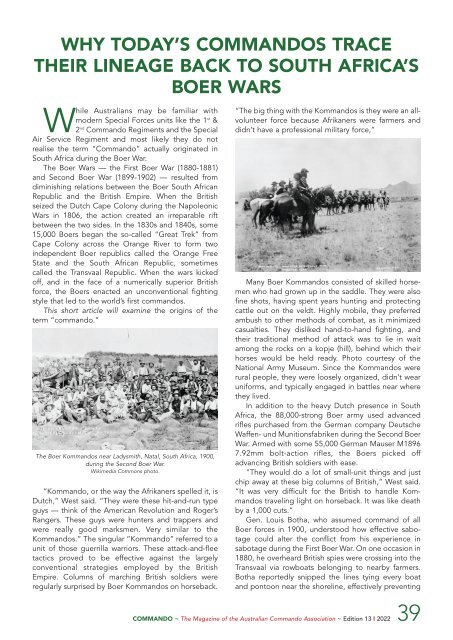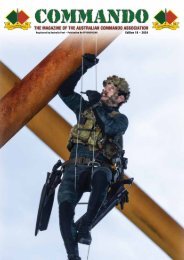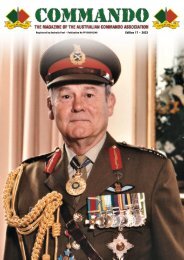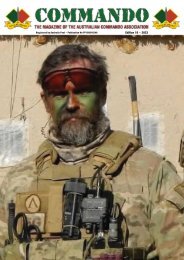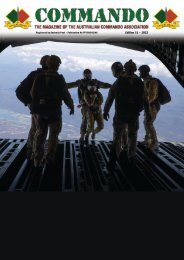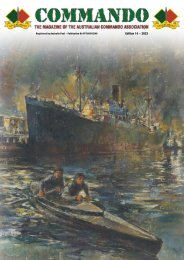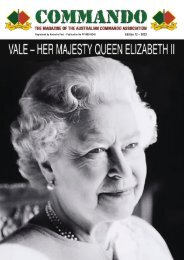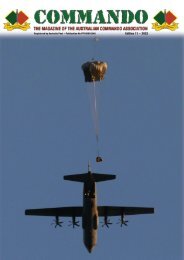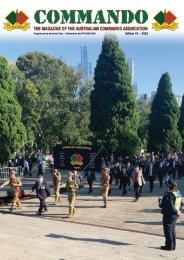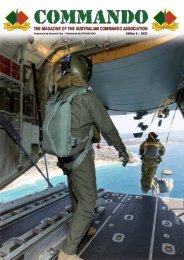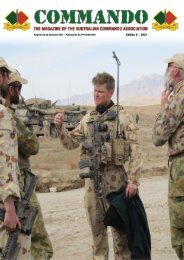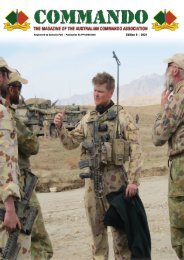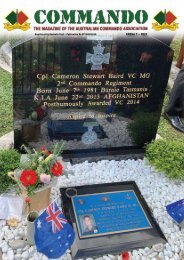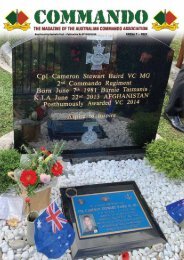Commando News Edition 13, 2022
You also want an ePaper? Increase the reach of your titles
YUMPU automatically turns print PDFs into web optimized ePapers that Google loves.
WHY TODAY’S COMMANDOS TRACE<br />
THEIR LINEAGE BACK TO SOUTH AFRICA’S<br />
BOER WARS<br />
While Australians may be familiar with<br />
modern Special Forces units like the 1 st &<br />
2 nd <strong>Commando</strong> Regiments and the Special<br />
Air Service Regiment and most likely they do not<br />
realise the term “<strong>Commando</strong>” actually originated in<br />
South Africa during the Boer War.<br />
The Boer Wars — the First Boer War (1880-1881)<br />
and Second Boer War (1899-1902) — resulted from<br />
diminishing relations between the Boer South African<br />
Republic and the British Empire. When the British<br />
seized the Dutch Cape Colony during the Napoleonic<br />
Wars in 1806, the action created an irreparable rift<br />
between the two sides. In the 1830s and 1840s, some<br />
15,000 Boers began the so-called “Great Trek” from<br />
Cape Colony across the Orange River to form two<br />
independent Boer republics called the Orange Free<br />
State and the South African Republic, sometimes<br />
called the Transvaal Republic. When the wars kicked<br />
off, and in the face of a numerically superior British<br />
force, the Boers enacted an unconventional fighting<br />
style that led to the world’s first commandos.<br />
This short article will examine the origins of the<br />
term “commando.”<br />
The Boer Kommandos near Ladysmith, Natal, South Africa, 1900,<br />
during the Second Boer War.<br />
Wikimedia Commons photo.<br />
“Kommando, or the way the Afrikaners spelled it, is<br />
Dutch,” West said. “They were these hit-and-run type<br />
guys — think of the American Revolution and Roger’s<br />
Rangers. These guys were hunters and trappers and<br />
were really good marksmen. Very similar to the<br />
Kommandos.” The singular “Kommando” referred to a<br />
unit of those guerrilla warriors. These attack-and-flee<br />
tactics proved to be effective against the largely<br />
conventional strategies employed by the British<br />
Empire. Columns of marching British soldiers were<br />
regularly surprised by Boer Kommandos on horseback.<br />
“The big thing with the Kommandos is they were an allvolunteer<br />
force because Afrikaners were farmers and<br />
didn’t have a professional military force,”<br />
Many Boer Kommandos consisted of skilled horse -<br />
men who had grown up in the saddle. They were also<br />
fine shots, having spent years hunting and protecting<br />
cattle out on the veldt. Highly mobile, they preferred<br />
ambush to other methods of combat, as it minimized<br />
casualties. They disliked hand-to-hand fighting, and<br />
their traditional method of attack was to lie in wait<br />
among the rocks on a kopje (hill), behind which their<br />
horses would be held ready. Photo courtesy of the<br />
National Army Museum. Since the Kommandos were<br />
rural people, they were loosely organized, didn’t wear<br />
uniforms, and typically engaged in battles near where<br />
they lived.<br />
In addition to the heavy Dutch presence in South<br />
Africa, the 88,000-strong Boer army used advanced<br />
rifles purchased from the German company Deutsche<br />
Waffen- und Munitionsfabriken during the Second Boer<br />
War. Armed with some 55,000 German Mauser M1896<br />
7.92mm bolt-action rifles, the Boers picked off<br />
advancing British soldiers with ease.<br />
"They would do a lot of small-unit things and just<br />
chip away at these big columns of British,” West said.<br />
“It was very difficult for the British to handle Kom -<br />
mandos traveling light on horseback. It was like death<br />
by a 1,000 cuts.”<br />
Gen. Louis Botha, who assumed command of all<br />
Boer forces in 1900, understood how effective sabo -<br />
tage could alter the conflict from his experience in<br />
sabotage during the First Boer War. On one occasion in<br />
1880, he overheard British spies were crossing into the<br />
Transvaal via rowboats belonging to nearby farmers.<br />
Botha reportedly snipped the lines tying every boat<br />
and pontoon near the shoreline, effectively preventing<br />
COMMANDO ~ The Magazine of the Australian <strong>Commando</strong> Association ~ <strong>Edition</strong> <strong>13</strong> I <strong>2022</strong> 39


